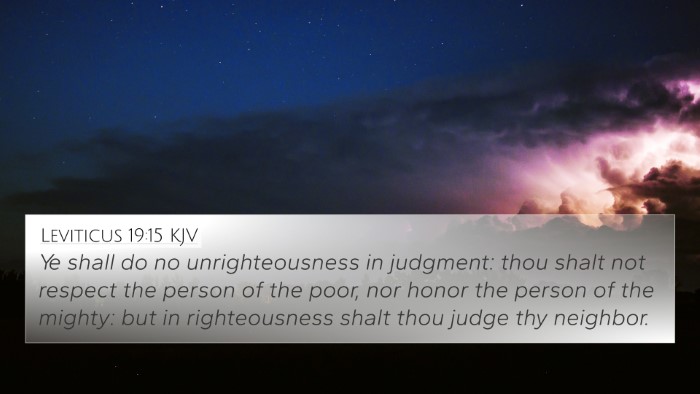Old Testament
Genesis Exodus Leviticus Numbers Deuteronomy Joshua Judges Ruth 1 Samuel 2 Samuel 1 Kings 2 Kings 1 Chronicles 2 Chronicles Ezra Nehemiah Esther Job Psalms Proverbs Ecclesiastes Song of Solomon Isaiah Jeremiah Lamentations Ezekiel Daniel Hosea Joel Amos Obadiah Jonah Micah Nahum Habakkuk Zephaniah Haggai Zechariah MalachiJob 32:21 Similar Verses
Job 32:21 Cross References
Let me not, I pray you, accept any man's person, neither let me give flattering titles unto man.
Uncover the Rich Themes and Topics of This Bible Verse
Listed below are the Bible themes associated with Job 32:21. We invite you to explore each theme to gain deeper insights into the Scriptures.
Job 32:21 Cross Reference Verses
This section features a detailed cross-reference designed to enrich your understanding of the Scriptures. Below, you will find carefully selected verses that echo the themes and teachings related to Job 32:21 KJV. Click on any image to explore detailed analyses of related Bible verses and uncover deeper theological insights.

Leviticus 19:15 (KJV) »
Ye shall do no unrighteousness in judgment: thou shalt not respect the person of the poor, nor honor the person of the mighty: but in righteousness shalt thou judge thy neighbor.

Matthew 22:16 (KJV) »
And they sent out unto him their disciples with the Herodians, saying, Master, we know that thou art true, and teachest the way of God in truth, neither carest thou for any man: for thou regardest not the person of men.

Job 34:19 (KJV) »
How much less to him that accepteth not the persons of princes, nor regardeth the rich more than the poor? for they all are the work of his hands.

2 Samuel 14:20 (KJV) »
To fetch about this form of speech hath thy servant Joab done this thing: and my lord is wise, according to the wisdom of an angel of God, to know all things that are in the earth.

2 Samuel 14:17 (KJV) »
Then thine handmaid said, The word of my lord the king shall now be comfortable: for as an angel of God, so is my lord the king to discern good and bad: therefore the LORD thy God will be with thee.

Deuteronomy 1:17 (KJV) »
Ye shall not respect persons in judgment; but ye shall hear the small as well as the great; ye shall not be afraid of the face of man; for the judgment is God's: and the cause that is too hard for you, bring it unto me, and I will hear it.

Proverbs 24:23 (KJV) »
These things also belong to the wise. It is not good to have respect of persons in judgment.

Deuteronomy 16:19 (KJV) »
Thou shalt not wrest judgment; thou shalt not respect persons, neither take a gift: for a gift doth blind the eyes of the wise, and pervert the words of the righteous.

Acts 24:2 (KJV) »
And when he was called forth, Tertullus began to accuse him, saying, Seeing that by thee we enjoy great quietness, and that very worthy deeds are done unto this nation by thy providence,
Job 32:21 Verse Analysis and Similar Verses
Understanding Job 32:21
Job 32:21 states: "Let me not, I pray you, accept any man's person, neither let me give flattering titles unto man."
This verse is spoken by Elihu, who is a younger figure in the dialogue of Job. Elihu's main concern is the truth and righteousness of God, and he desires to speak without bias or partiality. In the context of the Book of Job, where the characters are in a heated debate over suffering and divine justice, Elihu's statement reflects his commitment to presenting his views honestly and impartially, avoiding favoritism in his judgment.
Commentary Insights
Various public domain commentaries provide a rich understanding of this verse. These insights help readers grasp the broader meaning of Elihu's words.
- Matthew Henry’s Commentary: Henry emphasizes the importance of speaking without the influence of social standing or respect for persons. He notes that true wisdom speaks from a place of honesty and integrity, free from the pressure to please others.
- Albert Barnes’ Notes: Barnes points out that Elihu's aim is to declare the truth without any preconceived notions based on age or status. The line indicates his determination to present God's message in a straightforward manner, unclouded by human biases.
- Adam Clarke's Commentary: Clarke elaborates on the significance of avoiding flattery. He indicates that flattery undermines the integrity of communication and can lead to misinterpretations of God’s will. Elihu's stance serves as a reminder to seek honesty and seek God’s truth above social conventions.
Cross-References for Job 32:21
Understanding the connections between Bible verses enriches the study of scriptures. Below are key cross-references that relate to Job 32:21:
- James 2:1: This verse warns against favoritism, encouraging believers to not show partiality based on appearances.
- Proverbs 24:23: This passage states that it is not good to show partiality in judgment.
- Acts 10:34: Peter acknowledges that God shows no favoritism, reinforcing the idea of impartiality in divine judgment.
- Galatians 2:6: Paul emphasizes that those who are of high reputation do not affect the truth of the Gospel, demonstrating the irrelevance of human status in divine matters.
- 1 Timothy 5:21: This verse instructs Timothy to act without prejudice, showing that impartiality is essential in spiritual matters.
- Romans 2:11: Paul states that God does not show favoritism, extending the theme of impartiality in the context of salvation.
- Psalm 82:2: The psalmist questions the unjust judgments of human leaders and calls for equitable treatment of all, reflecting God’s sense of justice.
Thematic Connections
These cross-references illustrate a consistent Biblical theme: the rejection of favoritism and the call for impartiality in judgment. Analyzing Job 32:21 alongside these verses unfolds a broader conversation about justice, integrity, and truth-telling within Biblical context.
Conclusion
Job 32:21 encourages readers to seek a deeper understanding of how we relate to others while conveying our beliefs and truths. As Elihu stands ready to speak without bias, we are prompted to examine our approach to scripture and the judgments we make. Understanding the implications of impartiality, rooted in the teachings across various Biblical texts, strengthens our faith and our relationships within the community.
SEO Keywords for Further Study
- Bible verse cross-references
- Connections between Bible verses
- Linking Bible scriptures
- Comparative Bible verse analysis
- Bible verses that relate to each other
- Cross-referencing Biblical texts
- Thematic Bible verse connections
- Bible verse parallels
- Scriptural cross-referencing
- Inter-Biblical dialogue





